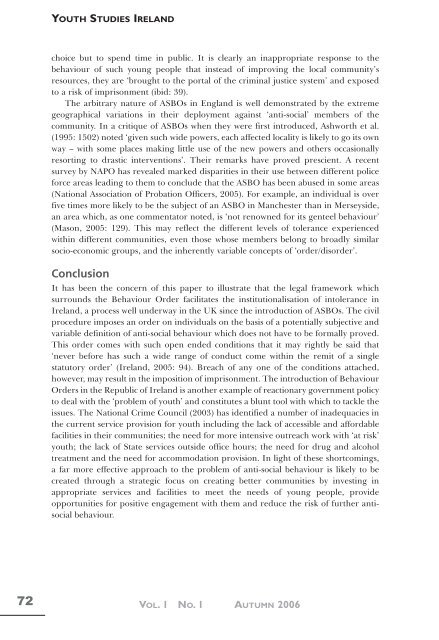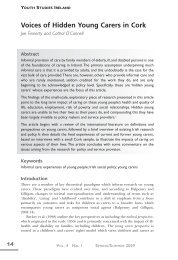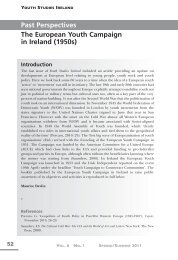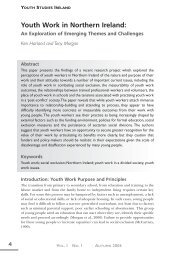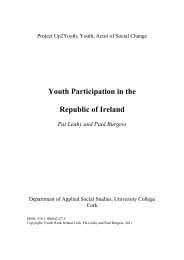YOUTH STUDIES IRELANDchoice but to spend time in public. It is clearly an inappropriate response to thebehaviour of such young people that instead of improving the local community’sresources, they are ‘brought to the portal of the criminal justice system’ and exposedto a risk of imprisonment (ibid: 39).The arbitrary nature of ASBOs in England is well demonstrated by the extremegeographical variations in their deployment against ‘anti-social’ members of thecommunity. In a critique of ASBOs when they were first introduced, Ashworth et al.(1995: 1502) noted ‘given such wide powers, each affected locality is likely to go its ownway – with some places making little use of the new powers and others occasionallyresorting to drastic interventions’. Their remarks have proved prescient. A recentsurvey by NAPO has revealed marked disparities in their use between different policeforce areas leading to them to conclude that the ASBO has been abused in some areas(National Association of Probation Officers, 2005). For example, an individual is overfive times more likely to be the subject of an ASBO in Manchester than in Merseyside,an area which, as one commentator noted, is ‘not renowned for its genteel behaviour’(Mason, 2005: 129). This may reflect the different levels of tolerance experiencedwithin different communities, even those whose members belong to broadly similarsocio-economic groups, and the inherently variable concepts of ‘order/disorder’.ConclusionIt has been the concern of this paper to illustrate that the legal framework whichsurrounds the Behaviour Order facilitates the institutionalisation of intolerance in<strong>Ireland</strong>, a process well underway in the UK since the introduction of ASBOs. The civilprocedure imposes an order on individuals on the basis of a potentially subjective andvariable definition of anti-social behaviour which does not have to be formally proved.This order comes with such open ended conditions that it may rightly be said that‘never before has such a wide range of conduct come within the remit of a singlestatutory order’ (<strong>Ireland</strong>, 2005: 94). Breach of any one of the conditions attached,however, may result in the imposition of imprisonment. The introduction of BehaviourOrders in the Republic of <strong>Ireland</strong> is another example of reactionary government policyto deal with the ‘problem of youth’ and constitutes a blunt tool with which to tackle theissues. The National Crime Council (2003) has identified a number of inadequacies inthe current service provision for youth including the lack of accessible and affordablefacilities in their communities; the need for more intensive outreach work with ‘at risk’youth; the lack of State services outside office hours; the need for drug and alcoholtreatment and the need for accommodation provision. In light of these shortcomings,a far more effective approach to the problem of anti-social behaviour is likely to becreated through a strategic focus on creating better communities by investing inappropriate services and facilities to meet the needs of young people, provideopportunities for positive engagement with them and reduce the risk of further antisocialbehaviour.72 VOL. 1 NO. 1 AUTUMN 2006
ASBOS and Behaviour Orders: Institutionalised Intolerance of <strong>Youth</strong>?Notes1 John Kelly TD, speaking during the debates on the Criminal Justice (Community Service) Bill 1983:Second Stage, Dail Debates, Vol. 432, 3rd May 1983.2 Pottinger v. City of Miami 810 F. Supp. 1551 (S.D.Fla. 1992).3 The Coalition Against Anti-Social Behaviour Orders was a broad based initiative determined to preventthe introduction behaviour orders as part of the new Criminal Justice Act. From a small core group –which included the Irish Penal Reform Trust, the Children’s Rights Alliance, the National <strong>Youth</strong> Councilof <strong>Ireland</strong>, the Irish Society for the Prevention of Cruelty to Children and the Irish Council for CivilLiberties – the Coalition eventually grew to include over 50 NGOs, community/voluntary youthorganisations, barristers, solicitors and academics from towns and cities across <strong>Ireland</strong>.4 The legislation appears somewhat confused in this regard in that the child shall be sent to a conferencewhere a Superintendent deems it to be beneficial in preventing further anti-social behaviour by the child.At the conference the child will be expected to enter into a ‘good behaviour contract’ for not longer thansix months. However, where this is not deemed appropriate (or where the child will not enter into a goodbehaviour contract/breaks the contract), the child may be referred to the Garda Diversion Programmewhere another conference will be held. This is obviously contradictory in that it is difficult to see how achild who is deemed unsuitable for a conference in one context can be deemed suitable for a similarprocedure in a different context, and the obvious inference must be that if a child is deemed unsuitableby a Superintendent for a conference, then s/he will apply to the courts for a Behaviour Order in respectof the child.5 Minister for Justice, Equality and Law Reform, Michael McDowell, Criminal Justice Bill 2004: CommitteeStage, Dáil Debates, Vol 81, 30th May 2006.6 [2002] UKHL 39.7 [2002] UKHL 39, para 113.8 House of Commons Written Answers Col 1143W, 4th February 2005.9 Minister for Justice, Equality and Law Reform, Michael McDowell, Criminal Justice Bill 2004: CommitteeStage, Dail Debates, Vol 81, 30th May 2006. Emphasis added.10 A statement of claim is a document that shows the defendant the case that is being against him or herwhich s/he must answer in court.11 One example of such an order in Britain is a prostitute in Manchester who was prohibited from carryingcondoms in the same area that her drug clinic was based (the clinic provided them to her as part of itsharm-reduction strategy).ReferencesAshworth, A., Gardner, J., Morgan R., Smith A.T.H., von Hirsch, A. and Wasik, M. (1995)‘Overtaking on the Right’, New Law Journal, 145: 1501–1502, 1516.Brewer, J.D., Lockhart, B. & Rodgers, P. (1997) Crime in <strong>Ireland</strong> 1945–95: ‘Here be Dragons’.Oxford: Clarendon Press.Brown, S. (1995) ‘Crime and Safety in Whose ‘Community’? Age, Everyday Life, and Problemsfor <strong>Youth</strong> Policy’, <strong>Youth</strong> & Policy: The Journal of Critical Analysis, 48: 27–48.Brown, S. (1998) Understanding <strong>Youth</strong> and Crime: Listening to <strong>Youth</strong>? Buckingham: Open University Press.Brown, A.P. (2004) ‘Anti-social Behaviour, Crime Control and Social Control’, Howard Journal ofCriminal Justice, 43 (2): 203–211.Burney, E. (2002) ‘Talking Tough, Acting Coy: What Happened to the Anti-Social BehaviourOrder?’, Howard Journal of Criminal Justice, 45 (1): 469–484.Campbell, B. (1993) Goliath: Britain’s Dangerous Places. London: Methuen.73
- Page 2:
YOUTH STUDIES IRELANDEditorial‘Yo
- Page 5 and 6:
Youth Work in Northern IrelandStruc
- Page 8:
YOUTH STUDIES IRELANDThese principl
- Page 11 and 12:
Youth Work in Northern IrelandMany
- Page 13 and 14:
Youth Work in Northern Irelandthe d
- Page 15 and 16:
Youth Work in Northern IrelandA fur
- Page 17 and 18:
Youth Work in Northern IrelandAckno
- Page 19 and 20:
YOUTH STUDIES IRELANDYouth, Governa
- Page 21 and 22: Youth, Governance and the Citycommu
- Page 23 and 24: Youth, Governance and the Cityor be
- Page 25 and 26: Youth, Governance and the Cityunemp
- Page 27 and 28: Youth, Governance and the CityCase
- Page 29 and 30: Youth, Governance and the CityIn mo
- Page 31 and 32: Youth, Governance and the CityConcl
- Page 33 and 34: Youth, Governance and the City11 Ta
- Page 35 and 36: Youth, Governance and the CityBreat
- Page 37 and 38: Youth, Governance and the CityKelli
- Page 39 and 40: Youth, Governance and the CityWhela
- Page 41 and 42: Addressing Youth and Being Youngpro
- Page 43 and 44: Addressing Youth and Being YoungWit
- Page 45 and 46: Addressing Youth and Being YoungThe
- Page 47 and 48: Addressing Youth and Being Young‘
- Page 49 and 50: Addressing Youth and Being Youngdra
- Page 51 and 52: Addressing Youth and Being Youngwhe
- Page 53 and 54: Addressing Youth and Being Youngwho
- Page 55 and 56: Addressing Youth and Being Young12
- Page 57 and 58: Addressing Youth and Being YoungDe
- Page 59 and 60: Addressing Youth and Being YoungMcW
- Page 61 and 62: YOUTH STUDIES IRELANDASBOs and Beha
- Page 63 and 64: ASBOS and Behaviour Orders: Institu
- Page 65 and 66: ASBOS and Behaviour Orders: Institu
- Page 67 and 68: ASBOS and Behaviour Orders: Institu
- Page 69 and 70: ASBOS and Behaviour Orders: Institu
- Page 71: ASBOS and Behaviour Orders: Institu
- Page 75 and 76: ASBOS and Behaviour Orders: Institu
- Page 77 and 78: YOUTH STUDIES IRELANDTraveller Chil
- Page 79 and 80: Traveller Children and Education: P
- Page 81 and 82: Traveller Children and Education: P
- Page 83 and 84: Traveller Children and Education: P
- Page 85 and 86: Traveller Children and Education: P
- Page 87 and 88: Traveller Children and Education: P
- Page 89 and 90: Traveller Children and Education: P
- Page 91 and 92: Traveller Children and Education: P
- Page 93 and 94: Review ArticleReview ArticleSignifi
- Page 95 and 96: Review Articleis Social Care?’ an
- Page 97 and 98: Review ArticleShort Note on a Funda
- Page 99 and 100: ReviewReviewYouth Work Liaison Foru
- Page 101 and 102: Reviewdevelopments in areas related
- Page 103 and 104: 103


